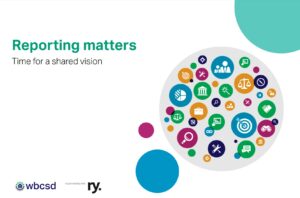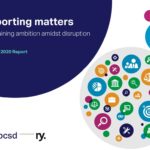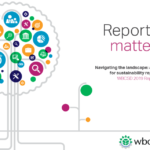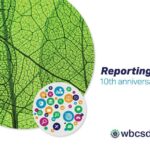
According to a new report launched today by the World Business Council for Sustainable Development (WBCSD), reporting and accountability are more important than ever as businesses strengthen their sustainability commitments through WBCSD’s updated membership conditions. The findings are included in the ninth edition of Reporting Matters – WBCSD’s annual review of its member companies’ sustainability and integrated reports in partnership with Radley Yeldar (RY). Spanning 168 leading global companies, this year’s research shows continued progress in corporate sustainability reporting. This year, Reporting Matters presents a focus on the role that corporate reporting plays in shaping and communicating the contribution of businesses in addressing unprecedented challenges in climate change, nature loss, and inequality.
Key findings from this year’s research:
Reporting is improving
- 76% of member companies in our benchmark have improved their Overall scores since the baseline year of 2018; 30% have improved their Materiality score.
The state of Sustainable Development Goal (SDG) reporting
- 90% of reports reviewed acknowledged the SDGs in some way; 35% prioritize 5-8 Goals to focus on.
The state of integrated reporting
- 40% of reports reviewed combine financial and non-financial information, up from 33% in 2018; 20% are self-declared integrated reports.
The state of Global Reporting Initiative (GRI) reporting
- 82% of reports reviewed reference the GRI, similar to 83% in 2018; 83% of these claim to be in accordance with the Core or Comprehensive level.
The emergence of Sustainability Accounting Standards Board (SASB) and Task Force on Climate-related Financial Disclosures (TCFD)
- 48% of reports reviewed reference the SASB standards, up from 9% in 2018; 74% reference the TCFD recommendations.
The future is digital
- 24% of reports reviewed provide a digital-first experience, up from 20% in 2018; 65% of members with an offline-first approach produce complementary online content.
Peter Bakker, President and CEO of WBCSD, said: “Amidst global efforts to bridge the disconnect between financial systems and environmental and social impacts, the business community is making stronger commitments to contributing to a net-zero, nature-positive and equitable future. Clarifying and harmonizing decision-useful sustainability information that companies share with financial actors and other stakeholders is an urgent priority. Reporting is central to upholding accountability and transparency in the sustainable transition.”
Jennifer Black, Sustainability Reporting Director at RY, said: “The results from this year’s Reporting Matters review reflect the wider adoption of frameworks and standards by businesses, particularly around SASB and TCFD. This is a promising trend as businesses focus on transparent and rigorous reporting, seeking ways to share decision-useful content that spans both the financial as well as the non-financial and taking us beyond a siloed approach to sustainability. The uptake of businesses reporting against the TCFD over the last year is especially heartening as businesses increasingly seek to integrate climate-related risks into their broader risk framework. I firmly believe that reporting, when done right, is both a valuable internal management tool for businesses, as well as a galvanizing force for sustainability action externally.”
Going forward, it is clear that the long-term strategic thinking set out by the SDGs, WBCSD’s Vision 2050 and the broader push for more inclusive forms of capitalism are needed more than ever. Companies must be resilient and maintain their sustainability momentum to survive.
With this backdrop, Reporting Matters will continue into 2022 as WBCSD and its member companies work to improve corporate reporting as we accelerate the transition to a sustainable world.
Download the full report here.



